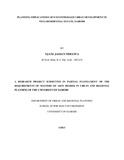| dc.description.abstract | Guiding urban development should be a priority because uncontrolled developments constrain
the provision of basic services hence deteriorating the living standards. According to Baross
(1990), planned urban development follows the traditional planning form of planning (P),
servicing (S), building (B) and occupation (0). The present study, which adopted a descriptive
cross sectional design, sought to establish the extent, cause and implications of uncontrolled
urban development in Tena residential estate, Nairobi. Quantitative data from the study were
analyzed using SPSS 19.0 while qualitative data from focus group discussions and key informant
interviews were analyzed on the basis of emerging themes.
Investigations on the extent of uncontrolled development in Tena Estates showed that most of the
developers had constructed multi-dwelling (68.2%) and commercial buildings (17.0%) as
opposed to 14.8% single-dwelling units (maisonettes) as stipulated by the laws. Further, 19.3%
of the developments had complied with minimum building lines (6m) requirements The high rise
buildings observed were substandard with a substantial proportion (82.3%) lacking escalators as
required. Overall, only 3 buildings (3.4%) were found to have fully complied with the all the
regulations considered in the current study.
From the study findings, the causes of uncontrolled developments included; the high cost of land
and the developers’ perception that building one dwelling house per plot is not sensible,
economically. Other causes identified were; ignorance of developers, corruption in regulating
institutions, inaccurate policies guiding urban development and the costly and time-consuming
process of getting approvals for the plans. As a consequence, uncontrolled development has
resulted in constrained water supply system, haphazard parking of vehicles on the roads leading
to obstructions, poor aesthetics, insecurity and decreased value of property in the area. To
promote the supervision and monitoring of the development in the Estate, the study recommends
that there be a high level of collaboration among the approving agencies to ensure the developers
observes the development policies and regulations. The already developed premises meeting the
minimum development requirements should be considered for regularization. There is also a
need to review the current policy guidelines governing development in this area. | en |

